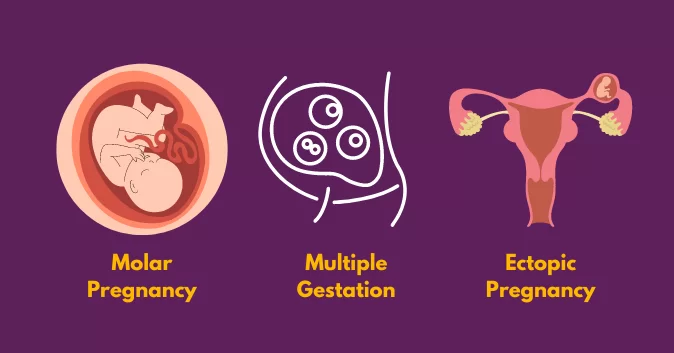Introduction
Human Chorionic Gonadotropin, commonly known as hCG, is often referred to as the “pregnancy hormone.” Produced by the placenta shortly after a fertilized egg attaches to the uterine lining, hCG plays a vital role in early pregnancy. It’s the hormone that pregnancy tests—both urine and blood—detect to confirm a pregnancy.
But hCG isn’t just a marker for pregnancy; its levels provide important insights into how the pregnancy is progressing. While every woman’s body is different, and hCG levels can vary widely, there are general patterns considered “normal.” Knowing what to expect, how hCG is tracked, and when to be concerned can offer peace of mind during those critical first weeks.
Normal Ranges
hCG levels start to rise rapidly in early pregnancy—doubling approximately every 48 to 72 hours during the first few weeks. Here are the average normal ranges of hCG levels measured in milli-international units per milliliter (mIU/mL), based on gestational age from the Last Menstrual Period (LMP):
| Weeks Since LMP | Typical hCG Range (mIU/mL) |
| 3 weeks | 5 – 50 |
| 4 weeks | 5 – 426 |
| 5 weeks | 18 – 7,340 |
| 6 weeks | 1,080 – 56,500 |
| 7–8 weeks | 7,650 – 229,000 |
| 9–12 weeks | 25,700 – 288,000 |
| 13–16 weeks | 13,300 – 254,000 |
| 17–24 weeks | 4,060 – 165,400 |
| 25–40 weeks | 3,640 – 117,000 |
Important Notes:
- hCG levels can vary widely from person to person.
- The trend in hCG levels is more important than the absolute number.
- hCG typically peaks around weeks 9–12, then slowly declines and levels off for the rest of the pregnancy.
Tracking hCG
Tracking hCG levels is typically done through blood tests, particularly in early pregnancy or if complications are suspected. There are two main types of hCG blood tests:
1. Qualitative hCG Test
- Gives a simple “yes” or “no” answer on whether hCG is present.
- Confirms pregnancy.
2. Quantitative hCG Test (Beta hCG)
- Measures the exact amount of hCG in the blood.
- Used to monitor the progress of early pregnancy.
When Is Tracking Necessary?
Doctors may recommend tracking hCG if:
- There are symptoms like spotting, cramping, or pain.
- A pregnancy was achieved through IVF or fertility treatments.
- There’s a history of recurrent miscarriage.
- hCG levels appear abnormally high or low.
- An ectopic pregnancy is suspected.
What’s a Healthy hCG Rise?
In early pregnancy:
- hCG levels should double every 48–72 hours.
- A slower rise may indicate a potential issue.
- Once hCG reaches above 6,000 mIU/mL, doubling time slows, and ultrasound becomes the preferred tool for monitoring.
When to Be Concerned
While hCG levels vary, certain trends can raise red flags. Here are some scenarios where concern may be warranted:
1. Slow-Rising hCG
- May indicate a non-viable pregnancy, such as:
- Miscarriage (early pregnancy loss)
- Blighted ovum (no embryo develops)
- Ectopic pregnancy (fertilized egg implants outside the uterus)
- Requires repeat testing and ultrasound.
2. Rapidly Increasing hCG
- Can be seen in:
- Multiple pregnancies (twins or triplets)
- Molar pregnancy (abnormal tissue growth in the uterus)
- May prompt additional diagnostic tests.
3. Falling hCG
- Typically indicates:
- Miscarriage
- Failed implantation
- Chemical pregnancy (very early loss)
- hCG should decline naturally after a miscarriage or abortion, and levels are tracked to ensure complete recovery.
4. Persistently Low hCG
- If levels never reach 5 mIU/mL, pregnancy is unlikely.
- If levels rise but remain low, it could indicate a failing pregnancy or an ectopic implantation.
Note: No hCG number guarantees a healthy or unhealthy pregnancy. Ultrasound confirmation is often necessary to determine viability.
Conclusion
hCG is more than just a positive pregnancy test—it’s a key marker for tracking the early development of your baby. While normal levels vary, a steady increase is usually a good sign. Tracking hCG through blood tests is especially valuable in high-risk pregnancies or when complications are suspected.
However, it’s essential not to panic over a single test result. Always look at the trend over time and consult your healthcare provider for accurate interpretation. In combination with ultrasounds and symptoms, hCG monitoring can provide reassurance—or an early warning—so the right care can be given at the right time.
Understanding hCG helps you stay informed, proactive, and empowered during your pregnancy journey.
FAQs:
What are normal hCG levels?
They range from 5 to 288,000 mIU/mL, depending on how far along you are in pregnancy.
What does slow rising mean?
It may indicate a miscarriage, ectopic pregnancy, or non-viable pregnancy.
Can high levels mean twins?
Yes, twins or multiples can cause higher-than-average hCG levels.
When should hCG double?
Every 48–72 hours in early pregnancy (up to around 6,000 mIU/mL).
Are low levels a concern?
Sometimes. Persistently low or dropping levels may signal a failing pregnancy, but one test alone isn’t enough to diagnose.






